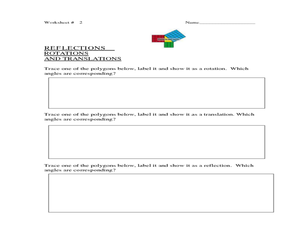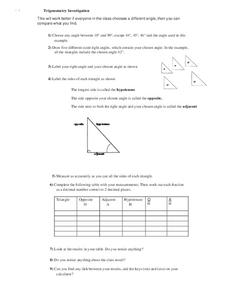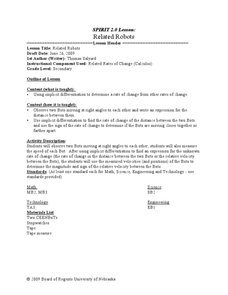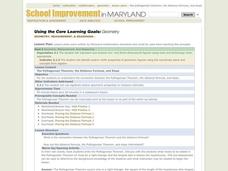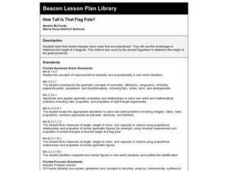Curated OER
Point Comparisons
Young geometers investigate two-dimensional figures using coordinate grids. They identify polygons and draw examples of their reflection, rotation, and translation on a coordinate grid. And they complete a worksheet practicing examples...
Curated OER
How Big Is a Blue?
Students sort and compare/contrast the lengths of various whales. They sort pictures of whales in order of smallest to largest, and given a rope marked with the lengths of the whales, they compare the actual lengths of the whales.
Curated OER
Vocabulary and Concept Development #2: struct and tract
Focus on the Latin roots struct and tract with this PowerPoint, boasting plenty of practice opportunities. To help develop a definition of each root, viewers match a list of words to their pictures. Then, they compare those words to a...
Mathematics Vision Project
Module 7: Trigonometric Functions, Equations, and Identities
Show your class that trigonometric functions have characteristics of their own. A resource explores the features of trigonometric functions. Learners then connect those concepts to inverse trigonometric functions and trigonometric...
Exploratorium
Rotating String Shapes
Here is a very interesting way of studying triangles and polygons. Pupils work together and use pieces of string to create a variety of shapes. Depending on how many kids are manipulating the string at any one time, the number of...
Curated OER
Similar Triangles
Ninth graders find the height of every day objects using techniques learned through postulates that allow triangles in a problem to be similar. They calculate the length of a missing side and solve proportions.
Curated OER
Obtuse Triangles
Fourth graders explore obtuse triangles. In this geometry lesson plan, 4th graders make obtuse triangles with paper and scissors. They determine how to find the center of their triangle.
Curated OER
Trigonometry Investigation
In this math activity, students use the sheet to conduct an investigation to find the trigonometric ratios using opposite and adjacent sides to see how they are related to each other.
Curated OER
Pythagorean Theorem
Students explore how the Pythagorean Theorem works and how to apply it.
Curated OER
Red October
Fourth graders follow directions given in bearings. They invent their own maps using them and use a protractor to help them with their designs. Students
produce their own maps with instructions for navigating the maps. The channels...
Curated OER
Three Tangent Circles
In this tangent circles worksheet, students use pi to solve a problem involving tangent circles. This one-page worksheet contains 1 problem. The answer is provided at the bottom of the page.
Curated OER
Ladybug Adventures
Students solve problems using mathematical skills. In this math lesson plan, the students use math concepts, to design a virtual path for a ladybug. The students will reinforce their skills in algebra and geometry concepts.
Curated OER
Congruent and Similar Figures: Reteach
In this congruent and similar figures activity, students review three steps to help them determine if figures are congruent, similar, or neither. Students then study the pairs of shapes and determine if they are congruent, similar, or...
Curated OER
Exploring Trigonometric Ratios
Students identify the ratios of trig functions. In this trigonometry lesson, students construct triangles and use it to derive the values of sine, cosine and tangent. They use Cabri software to create the visual of the identities.
Curated OER
Exploring Indiana's Natural Resources
Fourth graders complete a variety of activities as they study the European exploration of the Midwest, focusing on Indiana. They map the path explorers took, comparing the British with the French. They research why the explorers stopped...
Curated OER
The Relationship Between Slope and Perpendicular Lines
In this perpendicular lines worksheet, students explore the relationship between perpendicular lines and slope in eight exercises and two worked examples. The solutions are provided.
Curated OER
An Introduction to Quadrilaterals
Students explore different types of quadrilaterals. Students define the terminology used with quadrilaterals. They create particular quadrilaterals based on specific characteristics of the quadrilaterals using an online tool.
Curated OER
Related Robots
Students solve problems using implicit differentiation. In this calculus lesson, students take the derivative to calculate the rate of change. They observe two robots and draw conclusion from the data collected on the two robots.
Curated OER
The Laws of Sines and Cosines Made Simple!
Students explore the concept of law of sines and cosines. In this law of sines and cosines lesson, students construct a triangle tool from card stock and markers. Students use their triangle tool to aid in solving problems involving...
Curated OER
Studying Special Segments in Triangles
Students investigate special segments in triangles. In this geometry lesson, students graph, compare, estimate and predict findings based on their data. They differentiate between similarity and congruence of triangles.
Curated OER
Ship Shape
Second graders explore shapes. After reading books about shapes, 2nd graders describe the properties of various shapes. They identify shapes if they have been rotated, flipped, or slid. Students create shapes using drawings and geoboards.
Curated OER
Geometry Assessment-"Chapter 2"
In this geometry worksheet, students match terms with definitions, and complete short answer questions about polygons and congruency.
Curated OER
The Pythagorean Theorem, the Distance Formula, and Slope
Students explore the concept of the Pythagorean Theorem. In this Pythagorean Theorem lesson, students derive the distance formula and slope of a line from the Pythagorean Theorem.
Curated OER
How Tall Is That Flag Pole?
Students examine various triangles and discuss how similar triangles have sides that are proportional. They utilize an ancient Egyptian method to determine the height of a flagpole.


